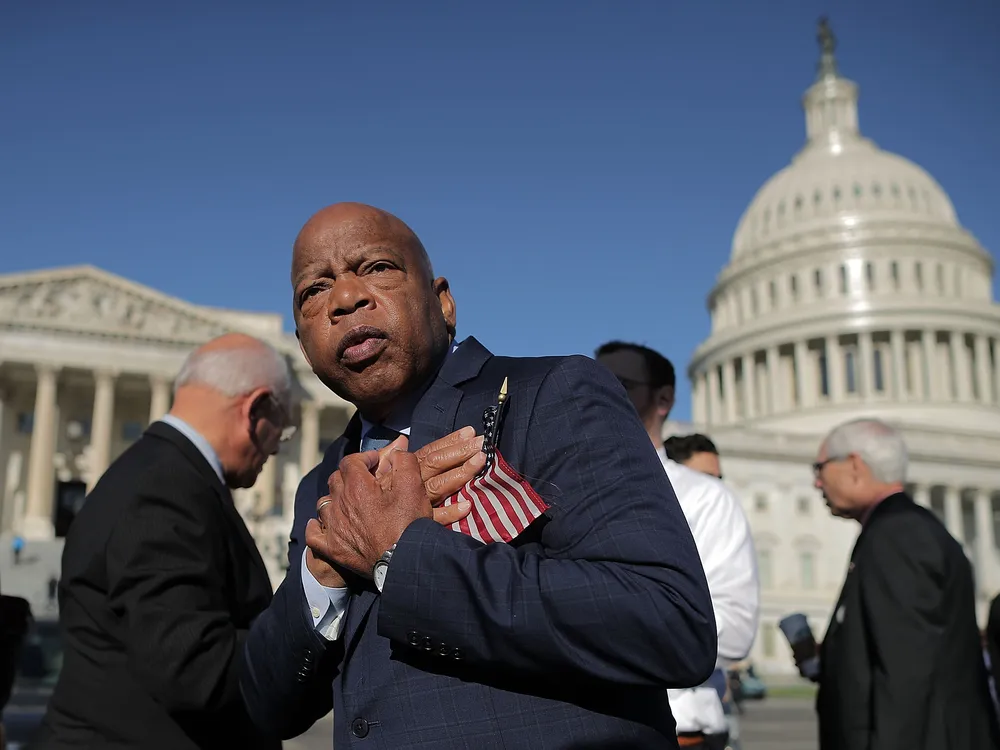Statue of Civil Rights Leader John Lewis Replaces Confederate Monument in Georgia
The 12-foot-tall bronze artwork depicts the former congressman with his hands over his heart

A statue of civil rights leader and former congressman John Lewis has replaced a Confederate monument in Georgia. The new sculpture, installed last week in front of the DeKalb Courthouse in Decatur, will be officially unveiled on August 24.
“It’s exciting to see it going up and exciting for the significance of what he represents and what he’s replacing,” sculptor Basil Watson, who made the new statue, tells the Associated Press’ Ron Harris.
DeKalb Courthouse lies inside the congressional district that Lewis represented for 17 consecutive terms—from 1987 until his death in 2020. For over a century, the courthouse had been decorated with a 30-foot stone obelisk, inscribed in part with, “to the memory of the soldiers and sailors of the Confederacy, of whose virtues in peace and in war are witnesses to the end that justice may be done and that the truth perish not.”

The obelisk was one of the hundreds of Confederate monuments to come down after George Floyd was murdered by police in 2020. That summer, a Decatur judge approved the obelisk’s removal at the behest of an attorney who cited the oft-vandalized monument as a public safety issue, as the Atlanta Journal-Constitution’s Tyler Estep and Amanda C. Coyne reported. After a crane lifted the obelisk from its base on June 18, 2020, locals toasted with champagne.
The new 12-foot-tall bronze statue depicts Lewis with his hands over his heart—“a gesture he used to express love to others,” as Decaturish’s Zoe Seiler wrote last year. The artwork starkly contrasts its predecessor, which honored the 19th-century Southern rebels who fought to preserve slavery. As the Washington Post’s Ben Brasch writes, “Lewis is a bona fide civil rights icon.”
Born in 1940 to poor sharecroppers in Alabama, Lewis began advocating for Black Americans’ rights at a young age. In the 1960s, inspired by Martin Luther King Jr., he co-founded the Student Nonviolent Coordinating Committee, which organized demonstrations across the South. Lewis spoke at the March on Washington in 1963. Two years later, he was beaten by police while helping lead a march across the Edmund Pettus Bridge in Selma, Alabama.
Lewis won a seat in Congress in 1986, and he held the office for over 30 years. As Alan Wheat, a former congressman from Missouri, told the Washington Post’s Laurence I. Barrett in 2020, “John’s biggest strength in the House was to motivate people, to gather impetus for key measures. He used his standing as a cultural icon for good causes, never for personal benefit.”
On July 17, 2020—a few weeks after DeKalb Courthouse’s obelisk came down—Lewis died of pancreatic cancer.
“It’s exciting to honor John Lewis,” Watson tells the AP. “He is really massive in terms of his contribution to America and the world, really.”



